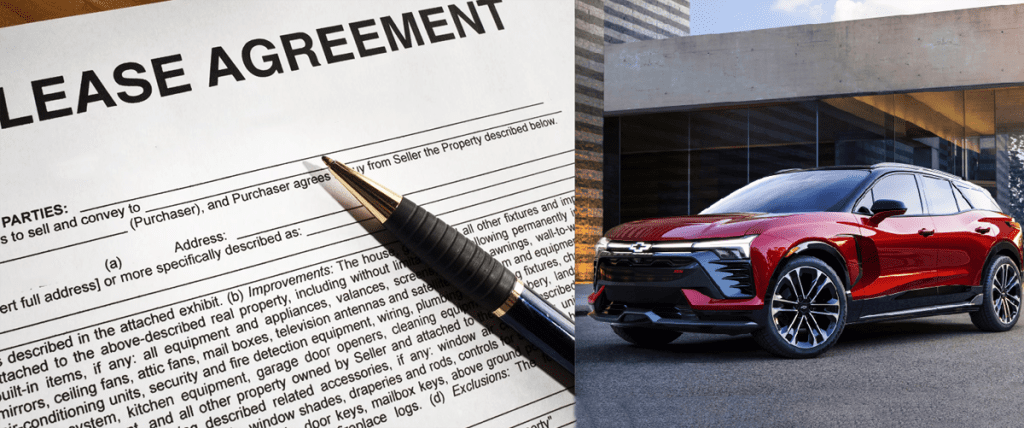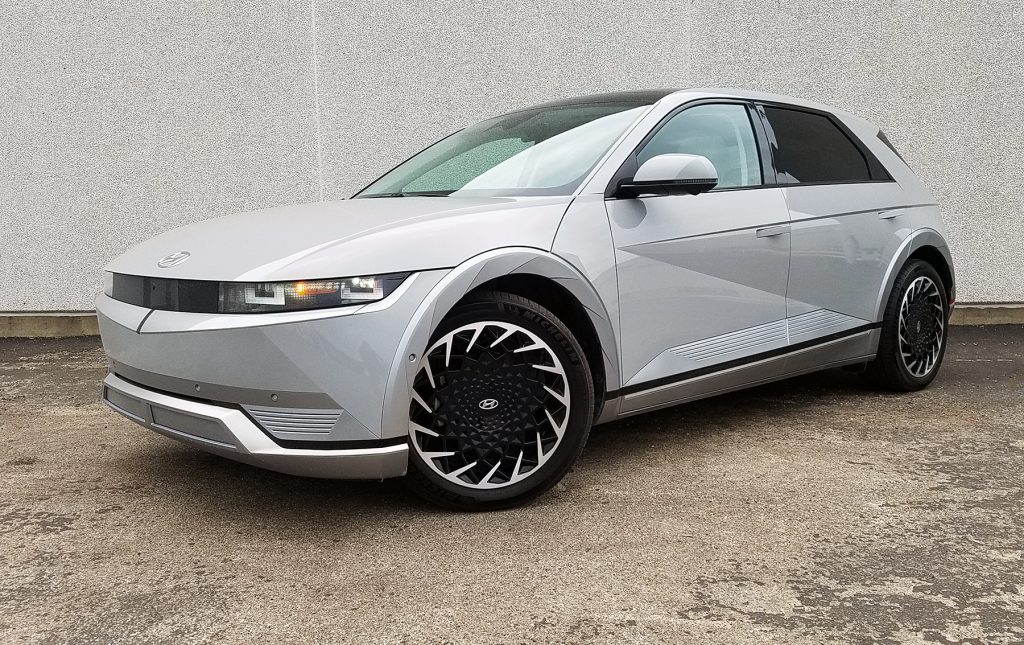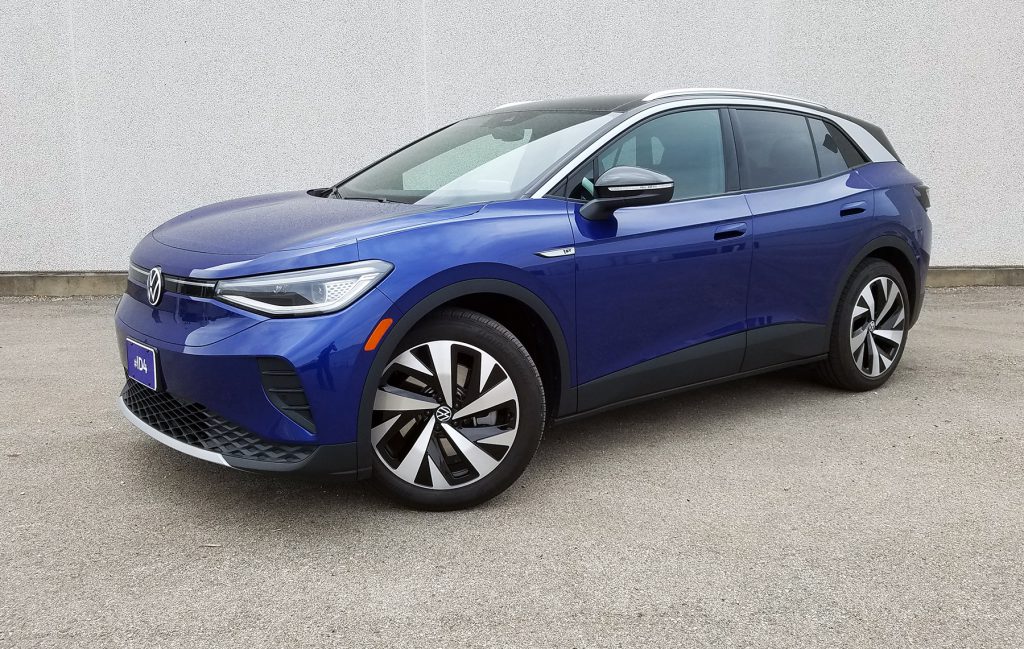Should I Lease My Electric Car? | The Daily Drive
CarNews
 Should I Lease My Electric Car? (2023 Chevrolet Blazer EV)
Should I Lease My Electric Car? (2023 Chevrolet Blazer EV)By James M. Flammang
If you’re ready to take the plunge into electric vehicles, one unavoidable decision has to be made: Do I want to own that EV after the last monthly payment, or should I lease it?
More electric-vehicle news and reviews
Should I Lease My Electric Car?
Several years back, before major gains in driving range and charging time, leasing EVs made sense for many people who sought to switch from a gas-engine vehicle to battery-only power. Among other benefits, a relatively short-term lease could ease the risk of getting stuck as the unhappy owner of a model that might soon be obsolete. Drivers unfamiliar with EVs could experience battery-powered transportation daily, without making a firm, seemingly permanent investment.
 Because it is not assembled in North America, the Hyundai Ioniq 5 does not quality for a EV-purchase Federal incentive.
Because it is not assembled in North America, the Hyundai Ioniq 5 does not quality for a EV-purchase Federal incentive.Leasing in general promises one time-honored financial benefit: lower monthly payments than most buyers face. In recent years, though, leasing of all vehicle types – electric, gasoline, or hybrid – has shrunk: from about one-third of the total in 2019 to less than one-fifth in 2022.
Recent technical advances, especially in increased range between charges, have made EVs more appealing. So has the Federal tax credit for electric and other “clean” vehicles, which could effectively reduce the total cost of obtaining an EV by several thousand dollars. A tax credit has been available as far back as 2005, said Scot Hall, executive vice-president of operations at Swapalease (a lease marketplace), under the Energy Policy Act.
Unfortunately for shoppers, the Clean Vehicle Credit, part of the Inflation Reduction Act (IRA) introduced under President Biden in 2021, wound up shrinking the number of EV models that qualified for a credit.
In order to be eligible for a $7,500 tax credit, a new EV had to meet four basic requirements. First, the vehicle had to be manufactured in North America. So did its battery’s minerals and related components. In addition, its MSRP (Manufacturers Suggested Retail Price) could not exceed $55,000 ($80,000 for vans, SUVs, and pickup trucks). Because the average EV costs more than $55,000 nowadays, quite a few models have failed to meet that price limit.
Clearly, such requirements were intended to promote production and use of battery-powered vehicles in North America, using tax credits as a monetary incentive. In reality, quite a few EVs that had been eligible were lopped off the list of qualifying models.
First Spin: 2023 Hyundai Ioniq 6
 The Chevrolet Bolt EV is one of the few electric vehicles which currently quality for a Federal electric-vehicle purchase incentive.
The Chevrolet Bolt EV is one of the few electric vehicles which currently quality for a Federal electric-vehicle purchase incentive.In August 2022, a partial solution arrived in the form of an updated “guidance” ruling by the IRS, making more EVs eligible – but only if they were leased. According to this rule, “commercial” vehicle regulations permit leasing companies to claim the credit for vehicles they purchase, as long as they intend to lease them to customers.
Previously, both leased and purchased EVs were subject to “consumer” regulations, constricted by those weight/price and American-manufacture requirements. Under the “commercial” rule, as long as the EV is leased, not sold at retail, those limits no longer apply. Most notably, leased EVs no longer need to be assembled in North America to qualify for the tax credit.
This exception to the prior limitations was an “unintended consequence” of the Clean Vehicle Credit, said Swapalease’s Scot Hall. It’s likely to “create additional gray area and leave room for interpretation that will not make things better and/or easier.”
Under the current IRS rule, the EV must be sold by a qualified manufacturer directly to a leasing company. Leased EVs now qualify as “commercial” because the initial owner is a bank or finance company, not the eventual driver. So, the credit goes to the leasing organization.
This is important: Leasing companies are expected to pass along the credit amount to the customer, but they’re not obligated to do so. If applied to the contract terms, altering the lease rate or residual value, that credit could slash a couple of hundred dollars from a lessee’s monthly payment.
2023 CES: Sony Honda Afeela Concept
Electric Vehicles that Qualify for the Federal Tax Credit
Remember, though, a tax credit is far different from a rebate or other incentive. When buying an EV, any credit it warrants comes at transaction time. Those who lease don’t see any financial reward until they file their tax return. IRS Form 1040 contains a specific line used to request the credit.
In 2024, the nature of the credit is expected to change. The credit amount will become a simple discount on the vehicle’s price, unrelated to personal income tax, given to the lessee at transaction time.
2023 CES: 2024 Fiat 500e
Now assembled in Tennessee, the Volkswagen ID.4 does quality for a Federal EV purchase incentive.
Not every eligible EV qualifies for the full $7,500 credit. Actually, that figure consists of two separate credits, each amounting to half ($3,750). Both are related to battery construction. One of them is issued if at least 40 percent of critical minerals within the battery were are mined or processed in the U.S. (or by a trade partner).
The second credit specifies that 50 percent battery of solid battery components must be sourced in North America. An EV might qualify for either credit, or for both. Both percentages are supposed to increase yearly by 10 percent, until 2028.
As of April 2023, eight fully-electric models qualified for both credits ($7,500 total): Cadillac Lyriq, Chevrolet Bolt and EUV, Chevrolet Silverado, Ford F-150 Lightning, Tesla Model Y, Tesla Model 3 (Performance version), and Volkswagen ID.4. Forthcoming Chevrolet Blazer and Equinox EVs also are expected to qualify for both credits.
Currently, only a few EVs qualify for a single ($3,750) tax credit: Ford E-Transit, Ford Mustang Mach-E, and Tesla Model 3 (Standard Range with rear-drive only). Only one Rivian model, the least-costly R1S, meets the $80,000 SUV price limit. The more affordable Nissan Leaf lost its eligibility because of battery manufacture, but Nissan expects it to qualify eventually.
Buyers have to meet a requirement, too. Annual income must be lower than $300,000 for married couples filing jointly, $225,000 for heads of households, and $150,000 for others.
When the Inflation Reduction Act took effect, Hyundai/Kia models, among others, did not qualify for a tax credit because of foreign manufacture. Now, as long as they’re leased rather than purchased, the eligibility list includes Hyundai’s Ioniq 5 and Kona Electric, along with Kia EV6 and Niro EV crossovers. Japanese-made Toyotas now qualify too, if leased: the Prius Prime, RAV4 Prime, and bZ4X. Several plug-in hybrids also earn a tax credit.
Domino’s Rolls out Fleet of Chevrolet Bolt EVs for Pizza Delivery
Among the most-affordable electric vehicles, the Nissan Leaf is manufactured in Japan and does not qualify for Federal EV purchase incentives.
The list of eligible models is subject to change at any time, and unlikely to remain firm for very long. Websites for Tesla and some other manufacturers specify which models are eligible, and whether they deserve full or half credit. Details on currently qualifying models also may be found at fueleconomy.gov, a website for the U.S. Department of Energy. Before making a decision, though, be sure to get the latest information from the manufacturer or dealer. A few manufacturers incorporate the tax credit into the figures shown in advertisements for lease offers.
Instead of clarifying the rules, the recent changes have led to considerable confusion and frustration, not only by consumers, but by people in the automobile business. Opponents of the 2022-23 leasing revision have cited not only its details, but its ambiguity. Senator Joe Manchin (D-WV) introduced a bill claiming lack of “appropriate guidance,” calling the leasing bonus “clearly inconsistent with the intent of the law.”
Leasing appears to be gaining in popularity, whether because of (or despite) the available tax credits. According to Edmunds (an auto research firm), 37 percent of EVs delivered to customers in April 2023 were leased rather than purchased, versus only 13 percent a year earlier.
Incidentally, the vehicle sales cap that applied for years is now gone. Previously, once an automaker sold more than 200,000 qualifying vehicles, the tax credit began to phase out.
So, weighing the tax credit along with other benefits (and demerits) of driving an EV, should you lease or buy the model you’re considering? In addition to the monetary factors, that depends largely on the manufacturer’s history with battery power.
Gods, Diamonds, and Mystical Beasts: The Fascinating World of Car Company Logos
Volkswagen Launches New Scout EV Brand
Teslas, for instance, seem to be better candidates for purchase, because of their well-established record and lengthy presence in the EV marketplace. Nissan’s Leaf, for one, also has an admirable history, but lower-cost models aren’t as likely to tempt folks who prefer to lease.
Used EVs also have a Federal tax credit available. Requirements are similar but not identical to those for new models, and the credit limit is $4,000. Annual income limits to qualify for any credit are half the amounts for new vehicles.
Hyundai and Kia, which share a South Korean parent company, were second only to Tesla in EV sales prior to the recent rule changes, which left their battery-powered vehicles ineligible for credit until the leasing exemption arrived. Hyundai Motor America CEO Randy Parker told CNBC that the proportion of leased Hyundai Ioniq 5 EVs leaped from 2 percent early in 2023 to more than 30 percent in April.
Both Hyundai and Kia have introduced $499/month leasing deals for their Ioniq 5 and EV6, respectively. Hyundai wants to “highlight leasing,” CEO Parker added, allowing consumers to “take advantage of the tax credit.”
Note that the most tempting deals aren’t always available everywhere. They might also have restrictions. As always, too, the best ones may be available only to shoppers with excellent credit ratings. Nothing new there. For a list of current lease offers, click here.
Remember, battery details are the determining factor for an EV’s overall eligibility to receive the Federal tax credit, and whether it’s the full credit or half. If it does qualify, and is to be purchased by an individual, all those requirements pertaining to price, weight, and manufacturer’s location must be met. But if it will be leased, they don’t apply.
Range before charging has improved steadily in recent years, and the number of new EV models keeps growing. Even so, more than one-third of respondents to a Reuters/Ipsos survey in March 2023 said they won’t consider any EV until they reach 500-mile range.
Meanwhile, quite a few automakers are not only developing new battery-powered models, but stepping up efforts to manufacture their electric vehicles in the U.S. In May, for instance, Hyundai announced that it will begin construction of a battery plant in Georgia, so its electrified vehicles can take full advantage of any tax credit. EV shoppers won’t be affected for quite a while, though. Hyundai’s new factory won’t be completed before 2026.
Test Drive: Mercedes-Benz EQS 580
What is a Kilowatt?
Listen to the Car Stuff Podcast
Electric-Vehicle Gallery
Click below for enlarged images
Chevrolet Bolt EV
Hyundai Ioniq 5
Nissan Leaf
Volkswagen ID.4
Should I Lease My Electric Car?
Classic Car Ads: Electric Cars
Should I Lease My Electric Car?
Car Stuff Podcast
Should I Lease My Electric Car?
 Now assembled in Tennessee, the Volkswagen ID.4 does quality for a Federal EV purchase incentive.
Now assembled in Tennessee, the Volkswagen ID.4 does quality for a Federal EV purchase incentive. Among the most-affordable electric vehicles, the Nissan Leaf is manufactured in Japan and does not qualify for Federal EV purchase incentives.
Among the most-affordable electric vehicles, the Nissan Leaf is manufactured in Japan and does not qualify for Federal EV purchase incentives. Chevrolet Bolt EV
Chevrolet Bolt EV  Hyundai Ioniq 5
Hyundai Ioniq 5  Nissan Leaf
Nissan Leaf  Volkswagen ID.4
Volkswagen ID.4







